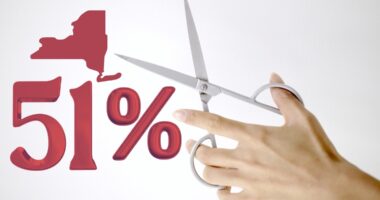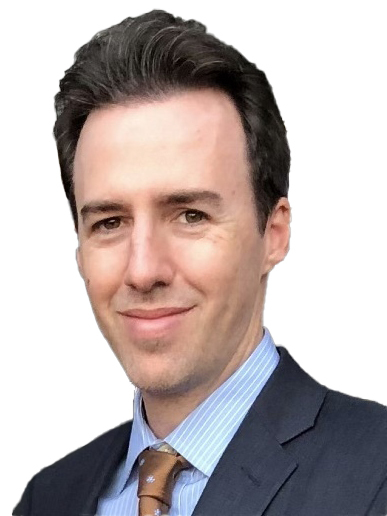DraftKings, FanDuel Claim New York Online Sports Betting Is Unsustainable

New York online sports betting raced out to the most successful launch in the country. But market leaders DraftKings and FanDuel warned lawmakers that revenue in future years will fall short of state projections without a reduction in the tax rate.
Speaking at a joint public committee hearing to evaluate the economic impact of online sports betting in New York after year one, DraftKings CEO Jason Robins and FanDuel President Christian Genetski argued that the New York online sports betting market is on the wrong trajectory.
Since launching last January, New York online sports betting broke records in its first year with a $16.2 billion handle, $1.36 billion in total revenue and $693 million in tax revenue. Including licensing fees, the total take for the state equaled $909 million.
But Robins and Genetski stated their case to the committee that those numbers aren’t sustainable under the curren
t tax structure. New York operators pay a 51% tax on online sports betting, matching the highest rate of any competitive market in the nation.
Genetski explained:
“Our ask is counter-intuitive, we have to acknowledge that. But we are partnered with the state. We want the same outcome the state does. We want the state to make more tax revenue, because that means that our business is growing. And we do believe that lowering the rate to increase investment, we do get there.”
Without a tax reduction, the sports betting executives warned of taking “draconian” measures to continue operating in New York. These include cuts in advertising and promotional bonuses and offering worse odds to New Yorkers than they do in other states.
Arguments for lowering NY online sports betting tax rate
DraftKings and FanDuel argued that, as a result of the high tax rate, the New York market has already peaked when it should be on a solid upward trajectory.
Operators offered strong promotions to start because they wanted to make their mark in the key New York marketplace.
But even as the market leader, Genetski said FanDuel could not make a profit in New York.
“The 51% tax rate precludes FanDuel from reaching sustainable profitability even with a dominant share,” Genetski said. “So FanDuel invests 50% less in New York than in other states.”
That lack of promotional and advertising spending could cause New York online sports betting to stagnate and decrease.
Spectrum Gaming backed up the argument with a report showing that New York online sports betting uncharacteristically trended downward.
New York online sports betting did 30% of its revenue in Q1 and 29% in Q4. David Isaacson of Spectrum Gaming explained that other states have all had their best quarter in Q4 of their first year. It’s typically the strongest sports betting quarter with the bulk of the NFL season. Isaacson concluded that it would be a challenge for operators to make a profit in New York going forward.
“In all the other states, I saw a big jump in terms of the percentage distribution of volume in Q4,” Isaacson said. “What I’m trying to highlight to the committee is that to me it is a red flag that in year two you could see a bit of a drop off, versus in all of these other states you saw a continued trend upwards.”
Assemblymember Gary Pretlow pushed back that the operators offered hundreds of millions of dollars of free play during Q1, skewing the comparison.
Consequences of keeping NY tax rate the same
Genetski compared the New York market to France. With the highest tax rate in Europe, it got off to a strong start in the first year. But since then, the number of operators in the market has halved and the unregulated market is thriving.
If the tax rate remains at 51%, operators warned that New York bettors, sports teams and the state’s bottom line would feel the results.
In order to be sustainable under the current system, Robins said DraftKings would need to:
- Meaningfully reduce promotional credits offered to New York customers.
- Cut marketing partnerships with New York sports teams and leagues.
- By the end of the year, provide New Yorkers worse odds than offered in other states, leading many to go back to betting in neighboring states or the illegal market.
Robins asserted:
“We haven’t taken some of the actions that I think would be most harmful and really could set back the market for years. It might take a long time to reactivate some of those customers if they choose to go back to the illegal market. I think we’re still in a position where New York can achieve its revenue projections and maybe even more so in the coming years, but I don’t think it’s remotely possible under the current tax setup.”
Genetski added that while states typically see an increase in sports betting revenue between year one and year five, New York would experience a decrease.
“This lack of investment by operators will compound over time to the state’s detriment. As the Spectrum report illustrates, we suspect that New York sports wagering handle will continue to drop 10-to-20% on a year-to-year basis.”
Benefits of lowering the NY tax rate
FanDuel asked lawmakers to consider lowering the tax rate to 35%.
Nine operators offer sports betting in New York. Two of the other states with a 51% tax rate, New Hampshire and Oregon, have only one operator. Arkansas levies that rate against its two online operators but has a lower rate for in-person bets at its casinos.
Robins said the average tax rate in other states with a competitive marketplace is 13%. The next-highest tax rate in a competitive marketplace is Pennsylvania’s 36%. Robins argued that operators in New York actually pay a 72% effective tax rate given that they are taxed on promotional spending.
With a 35% tax rate, Genetski said FanDuel would invest an additional $200 to $250 million in marketing and promotional spending in the New York market. He projects this investment would lead to an estimated $350 million in additional gross gaming revenue.
Genetski said that, despite the success in year one, FanDuel has one of is lowest market penetrations in the country in New York. Only 6.4% of adults have placed a bet on FanDuel, leaving plenty of room for improvement.
“We believe that lowering the tax rate to one commensurate with the next highest tax rate in the country can fundamentally alter the long-term outcome in New York,” Genetski said.
Lawmakers skeptical on lower tax rate growing revenue
Committee members pushed back on the unsustainability claims from operators.
Even Sen. Joe Addabbo, who introduced a bill that would lower the tax rate to 35% with an additional four operators, isn’t sold on the idea.
“In my opinion, there’s no real foundation to say these numbers are suffering at this point and so we need to change this. It’s a very hard argument to make.”
Addabbo asked if the operators had enough credible data to show that a reduction of the tax rate makes fiscal sense. Genetski and Robins said they would produce a detailed analysis.
Assemblymember Carrie Woerner focused on the numbers and how reducing the tax rate from 51% to 35% would require an additional $600 million in gross gaming revenue to avoid a reduction in the state’s share.
Genetski believes FanDuel alone would acquire an additional 300,000 users in New York with the additional spending. Plus the company would increase revenue by reinvesting in its existing user base with promotions and bonuses.
“We’re confident over that five year period … that lowering the tax rate in line with your proposal is going to produce more upside to the overall revenue that more than offsets the difference in the tax rate,” Genetski said. “So we do have conviction that this is the right path for the state.”
Woerner still wasn’t convinced.
“I have to s
ay, color me skeptical. And I only say that because I think there will be sort of a natural cap on the number of people who will engage in mobile wagering. And to recover $600 million is a big jump. I’m no fan of high tax rates, but I think this is a leap. So I’m going to look forward to the analysis you’re going to do to show us how that’s going to happen.”
Why operators initially accepted 51% NY tax rate
Lawmakers also called out operators for trying to change a tax rate they willfully agreed to only a year ago.
Robins argued that DraftKings really had no choice but to accept the rate because they couldn’t not be in the largest market in the nation. Genetski agreed that FanDuel wasn’t going to turn down the New York market, especially when it is headquartered in the state.
“Of course we’d rather be in New York than not, even at 51%,” Robins said. “We’re just going to have to have the worst consumer value proposition in the country to make that work.”
Robins said they also had to consider the possibility that they didn’t enter the market or didn’t spend aggressively in the early going to gain market share and then the legislature lowered the tax rate.
“What we said is it would be an absolute shame and we’d certainly be kicking ourselves if you folks decide a year from now after the market launched to lower the tax rate and we had assumed it was going to be 51% forever,” Robins said. “… So we made the choice to say, look, we’ll invest in a way that we know is unsustainable and we know is unprofitable in New York for the short term because the consequences … are so great.”
Addressing problem gambling concerns
James Maney, executive director of the New York Council on Problem Gaming, told lawmakers that the $6 million in online sports betting revenue going toward problem gaming is insufficient.
He asked lawmakers to increase the contribution to 3%. That would have generated about $21 million in the first year. New York lawmakers have introduced several bills looking to strengthen responsible gaming measures.
With additional revenue, Maney said New York could staff its problem gambling hotline 24/7 and put educators at all colleges to preach responsible gaming to the highest-problem demographic.
“We’re not doing enough at all, not even close,” Maney said. “ … Seven hundred million dollars in revenue and we gave less than 1% to problem gambling? We have to do better. We should want to do better.”
Several lawmakers discussed prohibiting marketing and advertising on college campuses.
New York State Gaming Commission director Robert Williams also spent much of his time addressing problem gambling. He recommended an increase in problem gambling funding, research and awareness.
Study on New York online casino
Although the hearing was on the first year of New York sports betting, some at the hearing were already looking forward to the push for online casino.
Spectrum issued updated online casino and online poker projections for New York of $2.3 to $3.1 million in gross gaming revenue in year one, increasing to $4 billion by year five.
Howard Glaser of Light & Wonder added that while sports betting has been a good appetizer in other states, online casino play is the main course. Online casino platforms already are legal surrounding New York in New Jersey, Pennsylvania and Connecticut.
Robins pitched that legalizing such gaming is an innovative way to generate an additional source of revenue.
Addabbo and Pretlow have said they will reintroduce New York online casino legislation this session.








